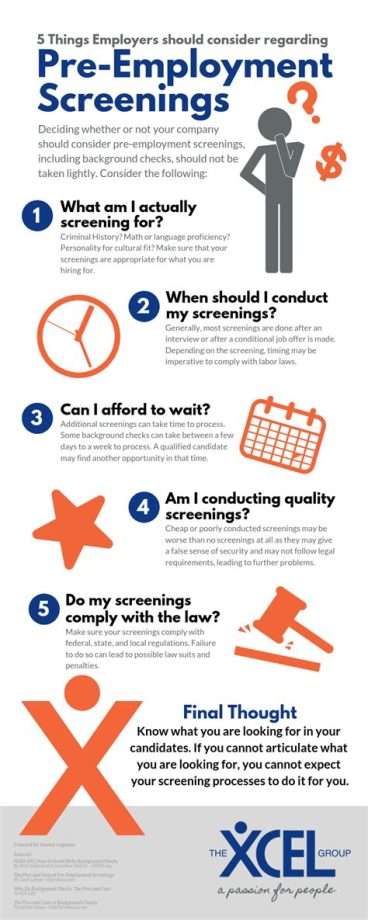Pre-Employment Screening: What To Expect

When applying for a new job, it’s common for employers to conduct pre-employment screenings to evaluate candidates’ qualifications, background, and suitability for the position. These screenings can vary depending on the industry, job role, and company policies. In this article, we will explore what you can expect during the pre-employment screening process and how to prepare for it.
1. Application Review
After submitting your application, the first step in the screening process is usually a review of your resume, cover letter, and any other supporting documents. This initial review helps employers determine if you meet the basic requirements for the position and have the necessary skills and experience.
2. Phone Interview
If your application passes the initial review, you may be invited to participate in a phone interview. This interview is typically conducted by a recruiter or hiring manager and serves as a way to further assess your qualifications, ask specific questions about your background and experience, and determine if you are a good fit for the company culture.
3. In-Person Interview
If you successfully pass the phone interview, the next step is usually an in-person interview. This interview allows the employer to meet you face-to-face, evaluate your communication and interpersonal skills, and assess your suitability for the role. The in-person interview may involve multiple rounds and may include behavioral, technical, or situational questions.
4. Skills Assessment
Depending on the position you are applying for, you may be required to complete a skills assessment. This assessment can be a written test, an online assessment, or a practical demonstration of your abilities. The purpose is to evaluate your technical skills and ensure that you can perform the tasks required for the job.
5. Background Check
Employers often conduct background checks to verify the information provided by candidates and ensure their credibility. This may include checking employment history, educational qualifications, criminal records, and references. It’s important to be honest and accurate in your application to avoid any discrepancies.
6. Drug Testing
In certain industries, such as healthcare or transportation, drug testing is a common part of the pre-employment screening process. This is done to ensure a safe and drug-free workplace. If drug testing is required, you will be asked to provide a sample, which will be tested for the presence of illegal substances.
7. Reference Checks
Employers often reach out to the references provided by candidates to gather additional information about their work ethic, skills, and character. It’s important to choose references who can provide a positive and accurate assessment of your abilities. Notify your references in advance so they are prepared to speak on your behalf.
8. Social Media Screening
With the proliferation of social media, many employers now conduct social media screenings to get a better understanding of candidates’ online presence and behavior. They may search for your profiles on platforms like LinkedIn, Facebook, or Twitter to assess your professionalism and suitability for the role.
9. Personality Assessment
In some cases, employers may administer personality assessments to gain insights into your work style, preferences, and compatibility with the company culture. These assessments can help employers determine if you are a good fit for the team and if your personality aligns with the requirements of the job.
10. Final Decision
After completing all the pre-employment screenings, the employer will make a final decision on whether to extend a job offer. This decision is based on a combination of factors, including your qualifications, interview performance, reference checks, and background checks. If you are selected, you will receive an official offer letter with details about the position, salary, and benefits.
Conclusion
Pre-employment screening is a crucial part of the hiring process that helps employers make informed decisions about potential candidates. By understanding what to expect and adequately preparing for each stage, you can increase your chances of success. Remember to be honest, professional, and thorough throughout the process, and showcase your skills and qualifications to stand out from the competition.
Frequently Asked Questions
1. How long does the pre-employment screening process take?
The duration of the pre-employment screening process can vary depending on various factors, such as the complexity of the role, the number of applicants, and the efficiency of the screening procedures. It can range from a few days to several weeks.
2. What happens if I fail the background check?
If you fail the background check, the employer may withdraw the job offer or take other appropriate actions based on their policies. It’s essential to be truthful in your application and address any potential issues proactively.
3. Can I refuse to take a drug test?
While it’s within your rights to refuse a drug test, doing so may result in the withdrawal of the job offer or elimination from the candidate pool. If you have legitimate concerns or reasons, it’s important to communicate them with the employer and discuss possible alternatives.
4. Can I prepare for a personality assessment?
Personality assessments are designed to assess your natural tendencies and preferences, so there is no specific preparation required. However, it’s a good idea to familiarize yourself with the job requirements and company culture to ensure a better fit.
Employers can typically search for publicly available information on your social media profiles. However, there are legal limitations on using certain types of information, such as religious beliefs, political affiliations, or protected characteristics, to make employment decisions.
Remember, each employer may have different screening processes, so it’s important to follow their instructions and requirements. Preparing for these screenings by showcasing your skills, qualifications, and professionalism can greatly increase your chances of securing a job offer.
